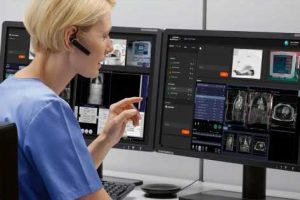Teleassistance in radiology

![]()
By Nadine Meru
Radiology is facing new challenges, such as a shortage of specialists. Large U.S. hospitals are responding by using a remote network access solution that brings relief to staff and patients.
Hurdles in diagnostics
The aging of the world’s population is the result of the continued decline in fertility rates and increased life expectancy. This demographic change means that there are more people over the age of 60,1 resulting in an overburdening of healthcare systems as these patients increasingly need more medical care. The rising demand and the complexity of different indications stretches medical radiology technicians to their limits. A new working method provides relief for the clinical team and offers new job opportunities.
The Great Resignation
AdventHealth is one of the hospitals affected by what the media has dubbed “The Great Resignation.” Advanced and complicated MRI scans are conducted on the main campus in Orlando, Florida, USA, where the hospital’s experienced technicians are based. This setup was developed when only the main hospital existed, and the medical technicians were trained conventionally. Things have changed over the last few years, as AdventHealth has grown and established outpatient departments with diagnostic care across the state. Melissa Petrasko, former Vice President of Imaging Services, Central Florida Division at AdventHealth explains, “We came up against barriers as advanced cases could not be performed in smaller campuses. The staff cannot be trained up there because the volume of those campuses was so low that maintaining competency was a criterion for us.”
Why teleassistance?
With AdventHealth’s previous setup, patients had to be transported from their small community hospitals to the main campus in Orlando for advanced procedures almost every day. Some ambulatory centers are about 30 miles away and, in some cases, the organization of such exams required a stay of more than 24 hours for the patient. It also created a backlog of planned MRI exams, which in turn increased turnaround times.
Training up staff
AdventHealth wanted a solution that eliminated the need to bring the patient to the technology – so they could instead bring the technology to the patient. Virtual technicians are equipped with a laptop and Siemens Healthineers’ remote scanning software “syngo Virtual Cockpit,”2 so they can scan remotely from any location.3
In 2019, AdventHealth installed syngo Virtual Cockpit, which can be used with CT, Spect, MR and MR PET scanners. “Since implementing this technology, we haven’t had to repeat a single patient,” said Petrasko. “Previously, the rescan rate in smaller campuses was around 40%. This technology enabled AdventHealth to grow its cardiac MRI market share by 38%. And the team loves it.”4 She pointed out, “Virtual technologists can operate three scanners at once. When someone calls up, we don’t have to cancel or reschedule; they just call their virtual technologist to help facilitate.”
“Virtual scanning allowed the expert to stay in one location without having to drive to another location and scan the patients without their having to be transferred over,” Lee said. Reducing the need for transport frees up resources for other purposes. Patients are given access to nearby scanner sites, which can be scheduled quickly with a shorter wait time.
Read the complete innovation story about teleassistance in radiology here.
Extend imaging hours and increase exam volume without moving staff
Another example of how teleassistance in radiology is changing the way of work is the smart mix of digital health solutions that enabled Geisinger to standardize radiology protocols, increase access to care and maximize equipment utilization. Remote scanning allows care teams to standardize care, increase productivity and deliver high quality imaging services across all locations.
Learn more about how Geisinger Health System is leveraging operational innovations to streamline and standardize care delivery here.
References
Source: Read Full Article




